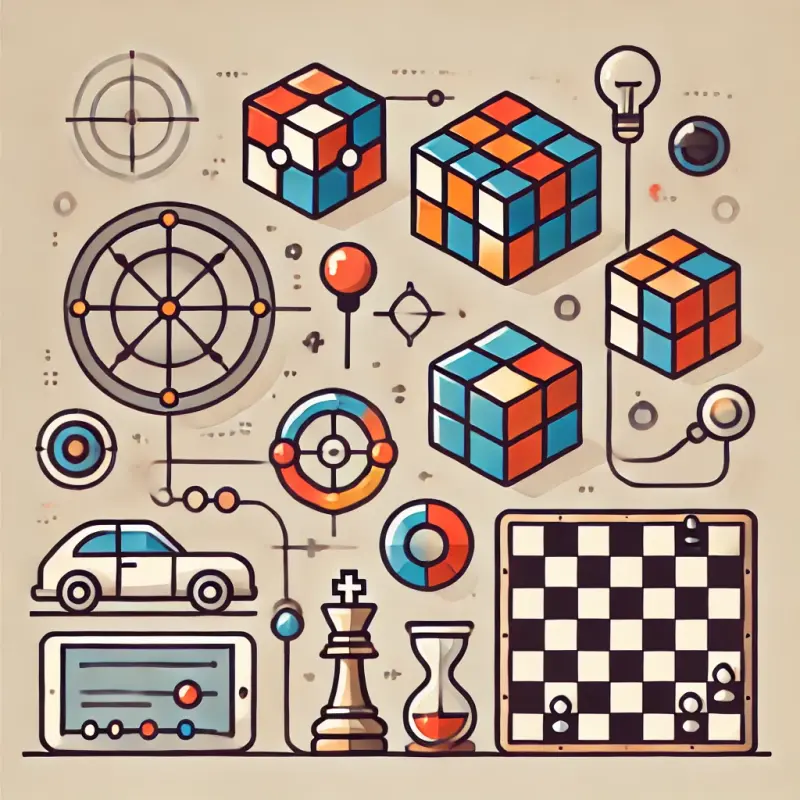How to Choose Educational Games to Develop Logical Thinking: Examples and Recommendations
Introduction
Educational games are a fun and effective way to develop logical thinking skills. They combine entertainment with problem-solving challenges, making learning engaging and interactive. Whether for children, students, or adults, selecting the right games tailored to specific needs can enhance cognitive abilities such as reasoning, planning, and critical thinking. In this article, we’ll discuss how to choose educational games for logical thinking, provide examples, and share tips for integrating them into a learning routine.
Why Use Educational Games for Logical Thinking?
Educational games are beneficial for logical thinking because they:
- Encourage Problem-Solving: Players must analyze situations and find solutions.
- Improve Pattern Recognition: Many games involve recognizing and predicting patterns.
- Promote Strategic Thinking: Games often require planning and anticipating outcomes.
- Enhance Decision-Making Skills: Players must evaluate choices and their consequences.
- Provide Instant Feedback: Games offer real-time results, helping players learn from mistakes.
Key Criteria for Choosing Educational Games
1. Age Appropriateness
- Select games with content and difficulty levels suitable for the player’s age group.
- For children, look for colorful, simple, and engaging designs.
- For adults, prioritize games with complex challenges or abstract reasoning tasks.
2. Cognitive Goals
- Choose games that align with specific skills you want to develop, such as:
- Logic puzzles for problem-solving.
- Strategy games for planning.
- Number games for mathematical reasoning.
3. Level of Engagement
- Opt for games that are interactive, fun, and challenging enough to hold interest.
- Avoid games that are too easy or overly frustrating, as they may reduce motivation.
4. Replayability
- Games with varying levels, challenges, or scenarios provide long-term learning opportunities.
- Look for games that adapt to the player’s progress, offering increasing complexity.
5. Platform and Accessibility
- Decide whether you prefer digital games (apps, online games) or physical ones (board games, card games).
- Ensure the chosen platform is accessible and compatible with your devices.
Examples of Educational Games for Logical Thinking
Digital Games
-
Sudoku (All Ages)
- Focus: Pattern recognition, critical thinking, and problem-solving.
- Why It’s Effective: Players fill a grid with numbers without repeating them in rows, columns, or boxes.
-
Portal Series (Teens and Adults)
- Focus: Spatial reasoning, logic, and physics-based puzzles.
- Why It’s Effective: Players solve puzzles by navigating through portals to achieve goals.
-
2048 (All Ages)
- Focus: Mathematical reasoning and strategic thinking.
- Why It’s Effective: Players combine tiles to create higher numbers, requiring planning and foresight.
-
Elevate (Adults)
- Focus: Brain training for logic, memory, and reasoning.
- Why It’s Effective: Daily challenges adapt to the user’s skill level.
Physical Games
-
Chess (Teens and Adults)
- Focus: Strategic planning and anticipating opponents’ moves.
- Why It’s Effective: Players must think several steps ahead to win.
-
Rubik’s Cube (All Ages)
- Focus: Spatial reasoning and problem-solving.
- Why It’s Effective: Solving the cube requires understanding patterns and algorithms.
-
Blokus (Children and Families)
- Focus: Spatial reasoning and strategic placement.
- Why It’s Effective: Players place colored pieces on a grid while blocking opponents’ moves.
-
Mastermind (All Ages)
- Focus: Deductive reasoning and pattern recognition.
- Why It’s Effective: Players use logic to crack a code created by their opponent.
Tips for Integrating Educational Games into Learning
1. Combine Play with Reflection
- After each game session, discuss what strategies worked and what could improve.
- Encourage players to articulate their thought processes to strengthen logical reasoning.
2. Set Goals for Gameplay
- Define what you want to achieve from the game, such as improving planning skills or mastering a specific challenge.
- Track progress to maintain motivation.
3. Balance Digital and Physical Games
- Rotate between digital and physical formats to keep learning dynamic and avoid screen fatigue.
4. Encourage Collaborative Play
- Multiplayer games or team-based challenges foster communication and cooperative problem-solving.
- For example, playing strategy games with friends can enhance teamwork and decision-making.
5. Adjust Complexity as Skills Improve
- Gradually introduce more challenging games to match the player’s growing abilities.
- Look for games with difficulty levels that scale over time.
How to Encourage Long-Term Engagement
- Incorporate Variety: Mix different types of games to maintain interest and cover multiple aspects of logical thinking.
- Reward Progress: Celebrate milestones, such as solving a tough puzzle or completing a difficult level.
- Make It Routine: Dedicate specific times for gameplay, such as a weekly family game night or daily 15-minute brain training.
- Explore Competitions: Join online or local tournaments to challenge yourself against others and stay motivated.
Long-Term Benefits of Educational Games
- Enhanced Cognitive Skills: Regular gameplay strengthens logical reasoning, memory, and problem-solving abilities.
- Increased Confidence: Success in games translates to improved confidence in tackling real-world challenges.
- Better Focus and Patience: Many games require sustained attention and strategic thinking.
- Teamwork and Social Skills: Multiplayer games encourage collaboration and communication.
Conclusion
Educational games are a versatile and enjoyable way to develop logical thinking skills. By choosing games tailored to age, interests, and cognitive goals, you can ensure a rewarding and stimulating experience. Whether through digital apps or traditional board games, incorporating playful challenges into your routine can lead to significant cognitive and personal growth. Start exploring the world of educational games today and watch your logic and creativity thrive!
Articole
Vreți să aduceți varietate în bucătăria de zi cu zi? Alăturați-vă comunității noastre și primiți rețete noi direct în inbox!
